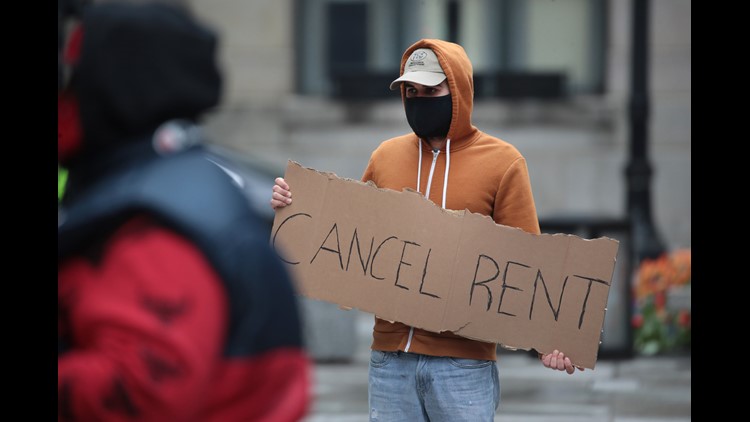Landlords across the country are anticipating fewer people will be able to pay rent in May than April. But they are even more worried about what comes in the months after.
By the last week of April, rent payments were not too far off from historical averages, according to the National Multifamily Housing Council. By then, 92% of the market-rate rental households the council tracks made full or partial payments, compared with 95% who paid by the same time in March -- before coronavirus started shutting down businesses across the US.
But with nearly 20% of the labor force claiming unemployment since mid-March, the ability of many people to pay their rent is fraying. In cities like New York, Chicago, Detroit, and Oakland, tenant rights groups are already calling for rent strikes, demanding the cancellation of rent during the crisis.
Renters might have had an initial safety net to pay in April, said Robert Pinnegar, president of the National Apartment Association, a nonprofit trade group of apartment owners. "Now with the increase in unemployment claims and stimulus money that may not have arrived yet, we are bracing for a far larger nonpayment rate in May."
With more than 43 million rental households in the US, landlords are increasingly aware of their tenant's uncertain financial security, and with it, their own.
Some landlords have their own mortgage payments to make or have building staff, maintenance workers and management companies who are now essential workers and still need to be paid. State and local governments will be relying on them to pay property taxes, and buildings may now have increased costs with more cleaning or health considerations due to the virus.
"The key for landlords is to be flexible," said Priscilla Almodovar, CEO of Enterprise Community Partners, a national nonprofit developing affordable housing. "They should reach out to tenants and make that connection with residents. They are in it together and they have a common interest."
Landlord outreach
While rental properties can range from large housing complexes to the upstairs apartment in an old brownstone, what landlords share is the need for their residents to pay.
"This isn't a huge margin industry where you have a lot of money readily available," said Pinnegar. "That is a misconception."
But he says landlords who can afford to could offer tenants relief through payment plans or reductions in rent.
"People are trying to do what they can to accommodate tenants, but it is unclear what they can afford," he said.
For example, he said, a landlord may set up a payment plan that allows a tenant rent relief for a few months if they sign up for another year lease. Back rent is spread over 18 months.
"But even when the economy is up and running, three or four months of rent payments spread out over several months will still be challenging for people to pay," Pinnegar said.
In the meantime, as eviction moratoriums -- that put the process of removing a tenant on pause -- are starting to be lifted, housing lawyers are urging landlords to remain calm
"We're telling landlords to just hold tight," said Hazel Remesch, supervising attorney, Legal Aid Society of Cleveland. "We are highlighting the public health issue of needing shelter to shelter-in-place. It will be difficult for landlords to fill their vacancies right now. They need to hold tight and see what relief money might be coming."
Looking for relief
It is unclear if stimulus payments and enhanced unemployment benefits are getting to families experiencing hardship and, if so, whether they will use the money for rent or other necessities, said Almodovar.
"Families who were living paycheck-to-paycheck are now reevaluating week-to-week," she said. "As are landlords. Owners and landlords are also financially strained."
Still, the high payment rate in April was encouraging, said Doug Bibby, president of the NMHC, but it was buoyed by a mixture of savings, relief funds, credit cards or payment plans offered by landlords.
Tenants' ability to pay and landlords' ability to provide grace in the long term is less clear.
"For that reason, lawmakers need to act now to enact a direct renter assistance program," Bibby said.
Many landlords and property owners are looking with concern toward August. By July 31, the majority of eviction moratoriums will have expired and the $600 supplemental payment to unemployment benefits is set to end.
"That's when the money runs out," said Almodovar. "We can't expect all these lost jobs will be back by August."
She said that while government benefits to Americans and philanthropic aid funds are providing some rent relief, it doesn't go nearly far enough.
"We need to prioritize emergency rental assistance through a federal program where the assistance goes to the landlord and credits the tenant for payment," she said.
May will be a pivotal month for rent payments and also the financial viability of the rental industry, said Pinnegar.
"They are pushing money into the hands of consumers," he said. "But will they use it to pay the rent or to buy food and stock up on toilet paper? That is the unknown. We're waiting to see what human behavior is come May."



